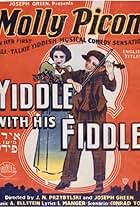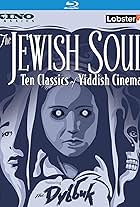Advanced search
- TITLES
- NAMES
- COLLABORATIONS
Search filters
Enter full date
to
or just enter yyyy, or yyyy-mm below
to
to
to
Exclude
Only includes titles with the selected topics
to
In minutes
to
1-50 of 92
- The 1941 invasion of Soviet Ukraine by Nazi Germany is shown through the life of inhabitants of a Yiddish village at the border of Poland.
- The mystical love story between Chonen, a poor Talmud student, and Lea, a girl from a wealthy family, depicts the traditional folk culture of Polish Jews before WW2.
- Within Brooklyn's ultra-orthodox Jewish community, a widower battles for custody of his son. A tender drama performed entirely in Yiddish, the film intimately explores the nature of faith and the price of parenthood.
- Two young people experience love and loss while in hiding during WWII. After a life of regret, the young man, now old, is faced with an opportunity for redemption.
- The original, non-musical film version of the book which inspired "Fiddler on the Roof".
- When you wage war on your community, you wage war on your family.
- From an early age Yossi Klein received a special education. He was prepared for another Holocaust. So were other children in Boro Park, the largest Orthodox survivor community in America, and this candid portrait of a young Jewish activist coming to terms with his father's traumatic history is as bracing as any fiction. Through his writing and activism, Yossi attempts to carry on the legacy of struggle passed on to him. A portrait emerges of a young man whose world view and personal outlook have been principally shaped by an event that took place before he was born.
- Mamele embraces the entire gamut of interwar Jewish life in Lodz - tenements and unemployed Jews, nightclubs and gangsters, religious Jews celebrating Sukkot - but the film belongs to Molly Picon who romps undaunted through her dutiful daughter role saving siblings, keeping the family intact, singing and acting her way through the stages of a woman's life from childhood to old age.
- A young woman posing as a man in a group of klezmer musicians in Poland.
- In a kosher meat packaging plant. Avrum one of the owners uncovers a operation involving his partner selling nonkosher meat under their company name. Can he stop it before it becomes a scandal and ruines the company?
- World War II. Tsili, a young Jewish woman, is hiding in the forest south of Czernowicz. Her entire family was deported to the camps. Hiding in the war zone, she builds a nest for herself. Escaping the savagery of the valley, she finds refuge in the nature.
- Historical documentary made up of footage and stills shot by the Nazis. A compilation of testimony from witnesses who appeared at the Eichmann trial provides a telling narrative.
- Saül Birnbaum is a "hidden child", who, at the age of six, was separated from his parents to escape the Holocaust. He was sent away by the so-called "Kindertransport". In 1986, Saül is on the path to recovery: he has opened a delicatessen unlike any other, where movies are shown every day. Saül and his protégé, Joakin, a young Chilean director who fled from Pinochet's dictatorship, decide to write the story of Saül's childhood and turn it into a film, allowing both of them to "heal" just a little more. However, love comes knocking on Saül's door, forcing him to confront his past.
- The action of the movie takes place in the thirties before the Jewish pogrom in the border town of Poland, which became a kind of emigration zone. Two teenagers - Ivan and Abram - run away from the dictates of adults into a big life.
- Wealthy, powerful sweatshop owner falls in love with employee's teenage daughter, who feels obligated to marry him after he shares his wealth with her parents, though she actually loves a young Marxist unionizer.
- Starring real-life mother and daughter Ester-Rokhl Kaminska and Ida Kaminska, this film is a precursor to the 1937 classic, The Dybbuk, featuring the same classic tale of frustrated love and destiny and the breaking/fulfillment of vows.
- One of the last Yiddish films made in Poland before the Nazi invasion, this film tells the story of a mother's persistent struggles to support her three children in pre-war World War II Polish Ukraine. After her family is pulled apart by severe poverty and the turmoil of war, she and her children make their way to New York and turn to the Hebrew Immigrant Aid Society for help.
- Ulmer's soulful, open-air adaptation of Peretz Hirshbein's classic play heralded the Golden Age of Yiddish cinema. When an ascetic young scholar ventures into the countryside, searching for the city of "true Jews," he learns some unexpected lessons from the Jewish peasants who take him in as a tutor for their children.
- In this musical comedy, the comic duo Dzigan and Shumacher play two small town "entrepreneurs" who believe they have struck oil in a local field. Thus begins a comedy of errors, including millionaire investors, American schemers, and insane asylums, with a little matchmaking on the side.
- Moishe Oysher gives his most robust performance as a passionate shtetl blacksmith who must struggle against temptation to become a mensch. Ulmer's film is a musical version of David Pinski's classic 1906 play Yankl der Schmid.
- In a small town in Russia in the 1880s, two young but poor lovers are helped by a wise old bookseller.
- On May 14, 1948 in Tel Aviv, David Ben-Gurion proclaimed the creation of the State of Israel... A historic date for Jews around the world, after 2,000 years of exile and the suffering endured by the survivors of the concentration camps. the death. But for more than 700,000 Palestinians who would have to leave their own lands, it was the beginning of an injustice. Through the itinerary of several families, the two documentaries presented here trace the destiny of the Jewish and Palestinian peoples throughout the 20th century. Illustrated with numerous unpublished documents, in color or colorized, from amateur films, family archives or excerpts from private diaries, the films propose to discover how the persecutions suffered by the Jewish people nourished the hope embodied by the Zionist dream, and led to the creation of the State of Israel, thus precipitating the misfortune of the Palestinian people.
- Setting off from Vilna to spend his last days in the Holy Land, an arrogant old man spurns the youngest of his three daughters and leaves his fortune in the wrong hands.
- This musical drama marks the screen debut of Moishe Oysher, in a film critic J. Hoberman calls an "anti-Jazz Singer." Oysher stars as a wayward youth who makes his way from his Polish shtetl to New York's Lower East Side where he is "discovered" and becomes a well-known singer. Ultimately, he returns home to the Old Country and reunites with his parents and his childhood sweetheart.






















